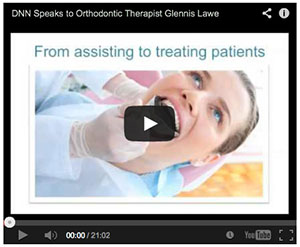 Orthodontic Therapists assist dentists in completing orthodontic treatment as well as carrying out specific parts of orthodontic treatment (under the prescription from a dentist)themselves. The patient is always under the care of their Orthodontists. Orthodontic Therapists also support patients and conduct emergency assistance by relieving pain or making, inserting or removing appliances safely. To train as an Orthodontic Therapist you must be qualified in dental nursing, dental hygiene, dental therapy or dental technology.
Orthodontic Therapists assist dentists in completing orthodontic treatment as well as carrying out specific parts of orthodontic treatment (under the prescription from a dentist)themselves. The patient is always under the care of their Orthodontists. Orthodontic Therapists also support patients and conduct emergency assistance by relieving pain or making, inserting or removing appliances safely. To train as an Orthodontic Therapist you must be qualified in dental nursing, dental hygiene, dental therapy or dental technology.
An Orthodontic Therapist has a wide scope of practice which ranges from: taking impressions, inserting passive and active removable orthodontic appliances, casting study models, fitting orthodontic headgear and placing on brackets and bands, identifying and using appropriate instruments, ensuring a patient’s orthodontic appliance is safe in the absence of the dentist, fitting orthodontic facebows (having been adjusted by the dentist), taking occlusal records, preparing, inserting and removing archwires, fitting tooth separators and bonded retainers, giving advice on oral health instruction and making appropriate referrals to other dental care or health care professionals. The list goes on as Orthodontic Therapists have the opportunity to develop their careers with additional skills and extended duties as well. Additional skills include: applying fluoride varnish, repairing the acrylic component part of orthodontic appliances, measuring and recording plaque indies and removing sutures.
Orthodontic Therapists can not do anything irreversible such as interdental stripping, activating removable appliances or requesting extractions. Orthodontic Therapists do not plan treatment.
 DNN met with Clare Shaw, a former dental nurse who is in her last few weeks of training to become an Orthodontic Therapist. We were eager to learn her story.
DNN met with Clare Shaw, a former dental nurse who is in her last few weeks of training to become an Orthodontic Therapist. We were eager to learn her story.
Clare started out her career as dental nurse. It was the first job she was offered when she had finished school. She decided that she would do it until she figured out what she really wanted to do.
‘It was never a conscious decision. I saw the advert in a local newspaper and thought it would be great temporary job. The truth is once I was in the world of dental care I never wanted to leave.’
Clare began her career in 1990, so life as a dental nurse was very different to how it is now. It wasn’t until registration by the GDC became a requirement that Clare ever really considered developing her career further.
‘As family life for me became a priority I found myself working 8 hours a day, two days a week. In 2008, I completed my NVQ Certificate in dental nursing and it was at this time, whilst working in my practice that I was talking with a colleague and we were discussing Orthodontic Therapy. It was something I had assumed wasn’t available here. I’d heard it talked about it in places like Germany and other areas in Europe. I didn’t know that there was the opportunity to train in it here.’
Clare’s practice decided that they wanted to train one of their dental nurses into an Orthodontic Therapist. It came down to Clare and one other nurse and Clare was chosen. In 2011 she completed her Orthodontic Nursing Certificate. For entry on to the course you need to have a dental nursing qualification and post qualification certificates are desirable.
‘The Orthodontic Nursing Certificate was a requirement at the time when I was applying to the Orthodontic Therapist Course. However, this is not vital I believe, for all courses across the UK.’
Clare applied and was accepted into the Yorkshire Orthodontic Course (YOTC). This is a part of The Royal College of Surgeons of London. The YOTC lasts for one year or 18 months part time. It involves an initial four week full-time core course based at the Leeds Dental Institute (LDI). This consists of academic learning, clinical skills and working in laboratories. Students work on phantom heads in laboratories before progressing to ‘live’ patients in orthodontic clinics. Following, this initial core course students work at their own practices as student Orthodontic Therapists, treating patients full time in order to gain the relevant skills and experience.
‘The application was quite intense. You can’t just fill it out yourself, you have to be backed by your employer, as well as inputting references. A lot of papers need to be signed. It is a long application process but I have to say it is well worth the effort. The application form can be downloaded on the RCS website’
Clare has been working hard and participating in the 1 year course. The course consists of practical and written assessments, as well as study days taught by Orthodontic Specialists. Clare has completed her practical experience in her own practice, supervised by an Orthodontist.
‘I was only away from my practice for the initial part of the course. After this I was back treating patients as a student. It was quite daunting leaving work as one of the nurses then returning after a month having nurses working for me. I was so used to be being told what to do it, it was weird to be the one doing the asking.’
Clare works 4 days: 4 mornings and 4 afternoon sessions a week. Her fridays are kept as her study day. All her practical experience is kept in a log book, all paperwork has to be backed up and kept on file. Student Orthodontic Therapists are closely supervised, every patient that Clare treats is checked and signed off by her supervising Orthodontist. To train as an Orthodontic Therapist you must be working with a qualified Orthodontic Specialist which can be in Primary or Secondary Care. The Orthodontic Specialist not only supervises all your work but gives weekly tutorials sessions on subjects deemed necessary. Clare is paid for her practical work.
‘Most girls on my course are funded by their practices but one girl has paid for her fees herself. The fees are £12000, as well as a £500 exam fee. My fees were funded by my employer but on top of this there are other costs to consider such as accommodation for the core course and travel and accommodation costs for study days. It is a big commitment and investment.’
‘I'm not 100% sure of all universities offering the course but I believe the following are: Leeds (YOTC), South Wales Orthodontic Therapy Course, Warwick, Bristol, Birmingham & Manchester. Leeds was the first one in 2007 and has a 100% pass rate so far, you can find the history of Orthodontic Therapists on the British Orthodontic Society Website.’
Throughout training there are 8 further study days which take place either at the LDI or at The Royal College of Surgeons (RCS), London. Clare’s final exams are in a few weeks time.
‘I don’t think you could do the course without having been a dental nurse first. There is no direct access course, as of yet. You need to come from a dental nurse background so if you are a dental nurse thinking of doing it then go for it. Work hard and study hard. You need to keep on top of the assessments and deadlines. You’ve really got to want to do it, you can’t just do it half heartedly. I am extremely excited to begin my next step in my career as a qualified Orthodontic Therapist.’
Salary for Orthodontic Therapists, although better much higher than dental nursing varies depending on where you live in the country and where you work. Our researched showed the hourly rate offered is anywhere between £25 per hour and £40 per hour.
Visit the GDC website to see which Universities offer the Orthodontic Therapist Course and their individual requirements.
